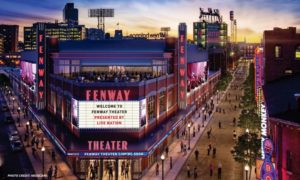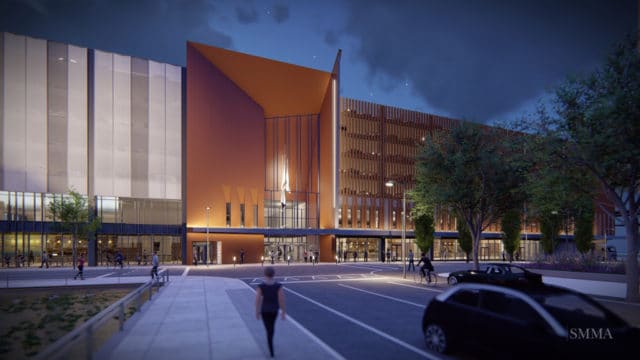
The owners of the Boston Red Sox are expanding their concert business with plans for an 87,000-square-foot music hall on Lansdowne Street.
In the Fenway, the live music scene is following the housing market on the road to gentrification.
Gritty rock clubs are giving way to upscale music halls touting chef-inspired dishes, LED walls and $3,200 VIP memberships.
As Fenway Park warms up for another summer slate of classic rock headliners, the Red Sox owners are eyeing some of their underutilized real estate to accommodate a sought-after niche in the live music business: mid-sized venues. The proposed Fenway Theater touts an intimate concert experience for 5,400 patrons on four levels.
It’s the same story at The Hub on Causeway, which will supplement the TD Garden’s 20,000-capacity arena with a new 40,000-square-foot music hall. And in Brighton, the Boston Landing development recently leased 41,000 square feet at its 172,000-square-foot track and field complex to the nation’s second largest concert promoter, Los Angeles-based AEG.
A confluence of factors is contributing to the concert hall boom, industry watchers say. Mixed-use developments are competing for distinct attractions to bring visitors to the property. With the decline of the big–box retail model, projects are adding more entertainment and dining to ground-floor spaces. And industry-leading concert promoters such as Live Nation and AEG continue to assert their market dominance, seeking to extend their reach from outdoor stadiums and arenas to mid-sized concert halls once controlled by independent promoters.
“Nobody’s going to make a fortune on this in a development, but you want it as a component,” said Mark Rosenshein, a partner at Boston-based development consultants Trademark Partners. “It’s really just a driver for people and a way to differentiate yourself.”
Lansdowne Street Nightclub Row Grows
A triangle of land behind the Fenway Park bleachers is envisioned as a new magnet for hundreds of live events annually.
Fenway Sports Group Real Estate submitted plans in late February for the nearly 87,000-square-foot Fenway Theater on a 1.5-acre parcel currently occupied by parking and a commissary.
The 4-story structure with a roof terrace will be run by a joint venture with Live Nation, which already manages the nearby House of Blues, and will coordinate bookings between the two venues, according to materials submitted to the Boston Planning and Development Agency. The theater will be laid out with flexible seating for approximately 150 concerts and 75 special events a year.

A venue proposed for Hood Park was silenced by its Charlestown neighbors, pointing to the challenges such venues face: noise, sudden and intense traffic and the need for an experienced operator.
Across town, Live Nation, operator of the recently-renamed Rockland Trust Pavilion in the Seaport District, is partnering with Boston-based Big Night Entertainment at the 1.9-million-square-foot Hub on Causeway at North Station. Festooned with Venetian curtains and crystal chandeliers, the 40,000-square-foot Big Night Live will include 30 VIP tables, private suites and a stage wrapped in LED walls. Boston-based Big Night, operator of such upscale nightclubs as the Grand and Scorpion Bar in the Seaport District, will manage the North Station venue scheduled to open this fall.
“Big Night Entertainment Group is an established luxury brand, and the way Bostonians are currently dining and socializing calls for a new way to enjoy live music as well. Big Night Live offers a first-of-its-kind hospitality-focused experience in Boston where a night out can include great dining, exceptional service and world-class entertainment,” Big Night Principal Ed Kane said in a statement.
NB Development, New Balance’s real estate arm that is developing the 1.9-million-square-foot Boston Landing, declined to comment on AEG’s plans for the 71 Guest St. facility.
The owners of Charlestown’s Hood Park had also proposed a 4,000-seat concert hall in 2017 as they expand the 20-acre business park with new office buildings and apartments. The live music component was silenced by neighborhood opposition.
That points to some of the unique challenges of concert halls, said Rosenshein, who is an adviser to Hood Park owners Catamount Management. Building designs require aggressive noise abatement, transportation plans need to account for brief bursts of heavy traffic, and developers need to select an operator well-versed in crowd control.
“There’s relatively few promoters that manage these well. You would not want to go into it with someone who doesn’t have experience,” Rosenshein said.
No companies fit that description better than Los Angeles-based Live Nation, which has built a $10 billion a year empire through dozens of acquisitions of smaller concert promoters. Live Nation’s 2009 acquisition of Ticketmaster gave it a powerful marketing tool and has spurred accusations that Live Nation pressured venues owned by AEG and others to contract with Ticketmaster or lose bookings. The TD Garden is among the venues allegedly threatened by Live Nation, according to a New York Times report detailing a U.S. Department of Justice probe into possible anti-trust violations. Live Nation denied the allegations.
Shrinking Options for Smaller Venues
The growth of the music hall category coincides with challenging prospects for smaller independent nightclub venues, which face rising rents throughout the city.
The high rents for ground floor space in the Seaport District – in the $100 per square foot range on a triple-net basis – have sent ripple effects into lower-priced neighborhoods, said Todd Smith, owner of Boston-based restaurant broker Corbett Restaurant Group.
“The growing neighborhoods certainly have seen an increase in rent, and that’s challenging with all the new competition,” Smith said. “It’s not just higher rent – they’re competing for the same customer base.”

Steve Adams
Displacement pressures from high-end housing projects are a continuing theme. In the latest example, London-based private student housing developer Scape is proposing a 500-unit student housing tower at 1252-1268 Boylston St. The 205,500-square-foot building would replace a 2-story office and retail building including the gay nightclub Machine.
“There’s not a lot of smaller space like that and if something like that will get redeveloped, you’d probably have to move to a new neighborhood,” Smith said. “There’s definitely still a desire for that type of venue.”




 |
| 